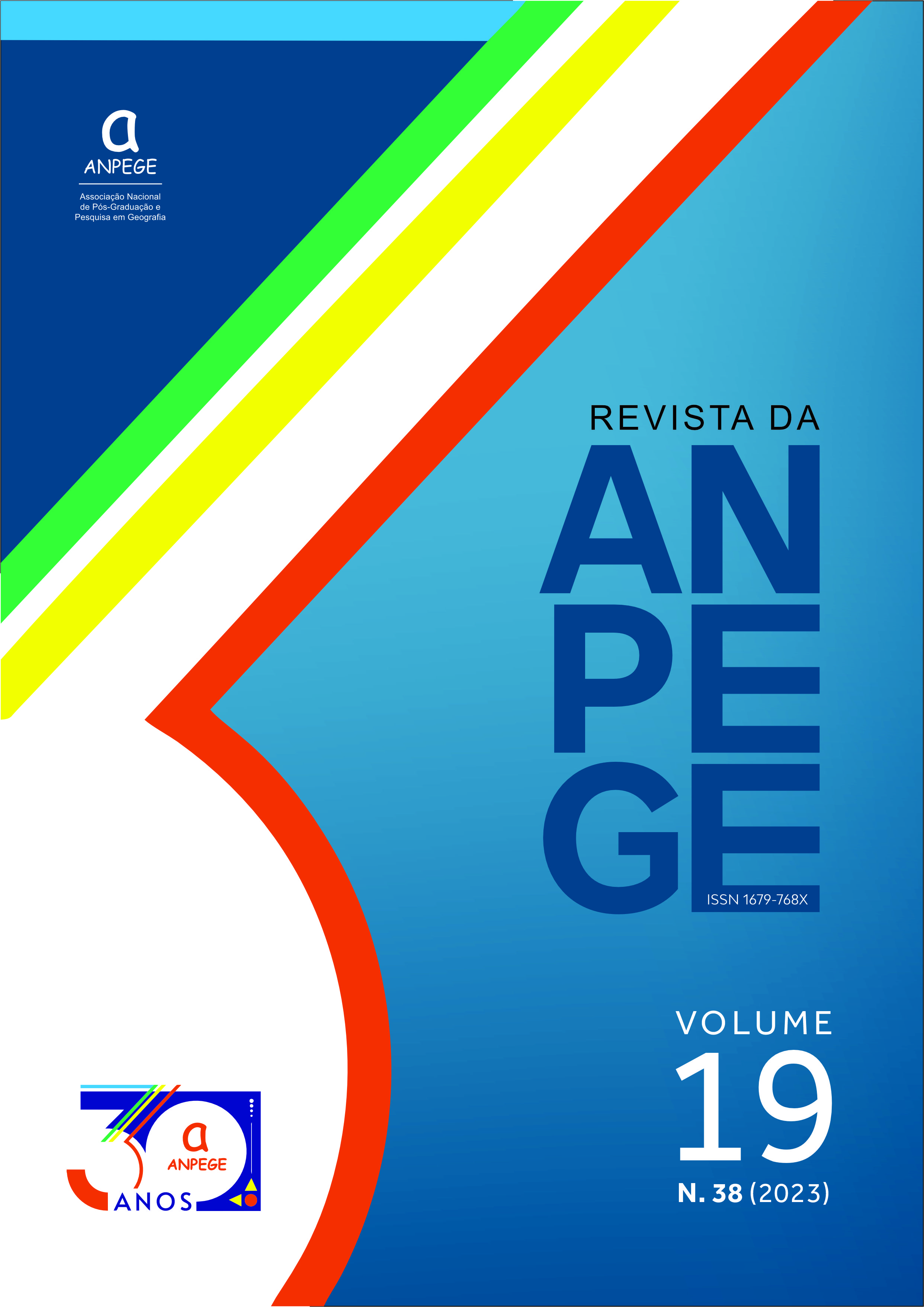Agenciamento e resistência no Atlântico Negro
o fenômeno da (des) (re)territorialização da população negro-africana sob uma perspectiva afrocêntrica
DOI:
https://doi.org/10.5418/ra2023.v19i38.13820Palavras-chave:
Atlântico Negro, Diáspora negro-africana, (Des)(Re)Territorialização, Afrocentricidade.Resumo
O artigo em tela apresenta o movimento de diáspora negro-africana sob a perspectiva do fenômeno da (des)(re)territorialização. Trata-se de uma análise “geo-histórica” elaborada sob o prisma da afrocentricidade, a qual tem como principal característica apresentar uma (re)leitura e sistematização do território do Atlântico Negro, a partir do protagonismo da população negra que, mesmo submetida às opressões do sistema mercantil-escravagista, conseguiu colocar em movimento ideias e estratégias que garantissem a sua sobrevivência e, posteriormente a sua (re)territorialização. Sob tal perspectiva, o navio negreiro, neste estudo, é invocado como um espaço de “agenciamentos de culturas”, um “território móvel” onde os povos negros superaram o trauma da travessia e conseguiram articular estratégias que garantissem a sua sobrevivência. Sendo assim, em caráter elucidativo, tomou-se como exemplo o processo de desterritorialização dos povos Jagas, na região centro-africana nos séculos XVI e XVII; e o processo de constituição do Quilombo de Palmares, sua máxima referência de reterritorialização.Downloads
Referências
ASANTE, Molefi K. Afrocentricidade: notas sobre uma posição disciplinar. In.: NASCIMENTO, Elisa L. (Org.). Afrocentricidade: uma abordagem epistemológica inovadora. São Paulo: Selo Negro, 2009.
CARNEIRO, Edison. O Quilombo dos Palmares. 3ª ed. Rio de Janeiro: Editora Civilização Brasileira, 1996.
CAVAZZI, Giovanni A. Descrição histórica dos três reinos do Congo, Matamba e Angola. 2 volumes. Lisboa: Junta de Investigações do Ultramar, 1965.
CLAVAL, Paul. A contribuição francesa ao desenvolvimento da abordagem cultural na Geografia. In: CORRÊA, R. L.; ROSENDAHL, Z. (Orgs.). Introdução à Geografia Cultural. Rio de Janeiro: Bertrand, Brasil, 2003. p. 147-166.
CORREA, A. M. Irmandade da Boa Morte como manifestação cultural afro-brasileira: de cultura alternativa a inserção global. 2004. 323 f. Tese (Doutorado em Geografia) – Universidade Federal do Rio de Janeiro, CCMN/PPGG, Rio de Janeiro, 2004.
CURTIN, Philip D. The Atlantic slave trade: a census. Wisconsin: The University of Wisconsin Press, 1969.
FLORENTINO, M. Em costas negras: uma história do tráfico de escravos entre a África e o Rio de Janeiro (sécs. XVIII e XIX). São Paulo: Cia das Letras, 1997.
FONSECA, Mariana B. Nzinga Mbandi e as guerras de resistência em Angola: século XVII. 2012. 177f. Dissertação (Mestrado em História Social), - Universidade de São Paulo, PPGHS/FFLCH, São Paulo, 2012.
FREITAS, Mário M. Reino Negro de Palmares. 2ª ed. Rio de Janeiro: Biblioteca do Exército, 1988.
GILROY, Paul. O Atlântico Negro: modernidade e dupla consciência. São Paulo, Ed 34; Rio de Janeiro, 2001.
LUZ, Marco A. O. Agadá: dinâmica da civilização africano-brasileira. Salvador: EDUFBA, 2003.
MATORY, J. L. Jeje: repensando nações e transnacionalismo. MANA. 1999, vol.5, n.1, pp. 57-80. DOI: https://doi.org/10.1590/S0104-93131999000100003
MELO, Emerson. A compreensão das dinâmicas territoriais afrorreligiosas a partir da perspectiva da afro-territorialidade: um estudo sobre o processo de constituição, organização e difusão do Candomblé Kétu. 225 f. Tese (Doutorado em Geografia), Universidade do Estado do Rio de Janeiro, IGEOG/PPGEO, Rio de Janeiro, 2019. Disponível em: http://www.bdtd.uerj.br/tde_busca/arquivo.php?codArquivo=15690. Acesso em: 15 jan. 2020.
SACK, R. Human territoriality: its theory and history. Cambrige, 1986.
SAID, Edward W. Cultura e imperialismo. São Paulo, Companhia das Letras, 1995.
SILVEIRA, Aline da F. Sá e. Resistência e protagonismo negro no espaço rural brasileiro: um debate sobre a formação dos territórios de quilombo. 238 f. Tese (Doutorado em Geografia), Universidade do Estado do Rio de Janeiro, IGEOG/PPGEO, Rio de Janeiro, 2019. Disponível em: < http://www.bdtd.uerj.br/tde_busca/arquivo.php?codArquivo=15571>. Acesso em: 15 jan. 2020.
VANSINA, Jan. Kingdoms of the Savanna. Madison: The University of Wisconsin Press, 1966.
Downloads
Publicado
Como Citar
Edição
Seção
Licença
Autores que publicam nesta revista concordam com os seguintes termos:Autores mantêm os direitos autorais e concedem à revista o direito de primeira publicação, com o trabalho simultaneamente licenciado sob a Creative Commons Atribuição-NãoComercial-CompartilhaIgual 3.0 Brasil que permitindo o compartilhamento do trabalho com reconhecimento da autoria do trabalho e publicação inicial nesta revista.
Autores têm autorização para assumir contratos adicionais separadamente, para distribuição não exclusiva da versão do trabalho publicada nesta revista (ex.: publicar em repositório institucional ou como capítulo de livro), com reconhecimento de autoria e publicação inicial nesta revista.
Autores têm permissão e são estimulados a publicar e distribuir seu trabalho online (ex.: em repositórios institucionais ou na sua página pessoal) a qualquer ponto antes ou durante o processo editorial, já que isso pode gerar alterações produtivas, bem como aumentar o impacto e a citação do trabalho publicado (Veja O Efeito do Acesso Livre em http://opcit.eprints.org/oacitation-biblio.html.)
Authors who publish with this journal agree to the following terms:
Authors retain copyrights and grant the Journal the right of first publication with the work simultaneously licensed under a Creative Commons Atribuição-NãoComercial-CompartilhaIgual 3.0 Brasil that allows others to share the work with an acknowledgement of the work's authorship and initial publication in this Journal.
Authors are permitted to enter into separate, additional contractual arrangements for the non-exclusive distribution of the Journal's published version of the work (e.g., post it to an institutional repository or in a book chapter), with an acknowledgement of authorship and initial publication in this journal.
Authors are permitted and encouraged to publish and share their work online (e.g., in institutional repositories or on their website) prior to and during the submission process, as it can lead to productive exchanges, as well as increase the impact and citation of published work (See The Effect of Open Access - http://opcit.eprints.org/oacitation-biblio.html.)




